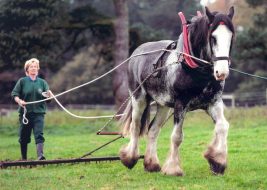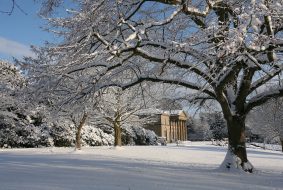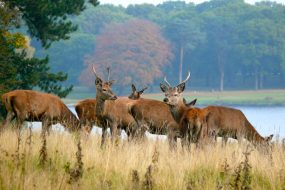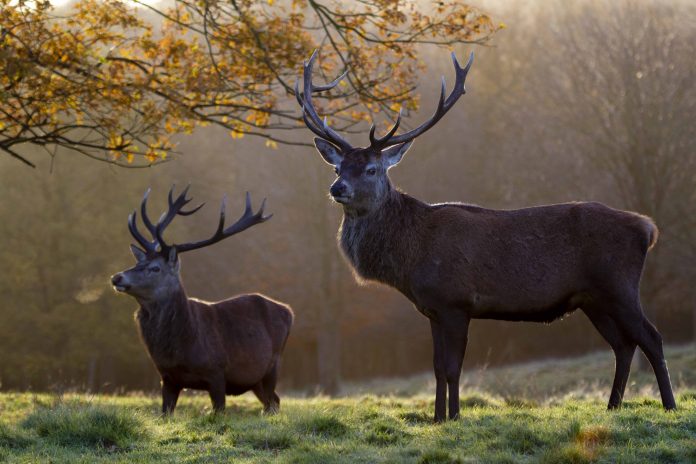With the arrival of Winter meaning longer nights and colder weather, many wildlife have to change their habits to ensure they stay well nourished in the winter months. At Tatton Park the rangers have a winter care routine that has been tried, tested and perfected over the years, from looking after the infamous Tatton deer to caring for the farm animals and award winning red poll cow.
About Manchester spoke to them:
Park Ranger Darren Morris has been working there for 30 years and has a lifelong interest in Natural history.
He mainly looks after the two herds of 600 deer, which consist of Red and Fallow Deer.
“We feed them daily with carrots, haylage and mineral nuts. The amount depends on the severity of the weather obviously in harsh, cold weather we increase the amount of
feed.”
“The challenge is to enable the deer to maintain condition during the winter when food is scarce.”
He also looks after two flocks of rare breed sheep totalling 200 animals. The breeds are Soay and Hebridean. “Again, we provide food for them and make sure they get adequate grazing.”
“As above if it gets too cold we have to feed more to the animals and make sure the sheep have access to water that is not frozen. Diesel engines can freeze and roads become hard to access making the practicalities of feeding the animals difficult. If it is excessively mild, bacteria will not be killed off and along with wet weather, the sheep will develop foot problems.”
 Clemency West has been a park ranger at Tatton for 13 years .
Clemency West has been a park ranger at Tatton for 13 years .
It is a varied role, she tells us with responsibilities covering: woodland management, livestock management, visitor services, security, education and maintenance.
The park is approximately 2000 acres of mixed woodland, parkland and farmland receiving nearly 1 million visitors a year, so there is a fine balance to manage conservation, health/safety and visitor enjoyment.
If the winter is particularly wet she says that although the deer have coats that are very good at shedding water the water will penetrate. Having some freezing weather in the winter is valuable to the grazing land as it helps to kill off any bacteria in the soil.
“Many of the animals, both deer and sheep, have learned to recognise the sound of Landrovers and tractors and associate them with food! So they will often come running towards the vehicles in anticipation of being fed…..which is an impressive sight
for the visitors.”
Farm assistant Sam Walton looks after all different sorts of farm livestock during the winter
months, including Cattle, Sheep, Pigs and Horses, even Reindeer.
Sam is a farmer’s son from Cheshire,Cheshire born and bred!
“I grew up on an Organic Mixed farm on the Arley Estate that was also open to the public as a visitor attraction. I knew from an early age that I wanted to be a farmer, just like my Dad!”
 One of his main jobs at the farm is too look after and manage the herd of Red Poll cattle we have here.
One of his main jobs at the farm is too look after and manage the herd of Red Poll cattle we have here.
“I am absolutely proud as punch that we have just been awarded the ‘Best Small Herd’ in
the national competition for Red Poll cattle, meaning that we have some of the best animals in the country here at Tatton Park.”
We asked the three of them how the changing seasons have effected their jobs.
“As farmers” , says Sam, its our job to work with the seasons and the jobs we
do at the farm are definitely dictated to by how the seasons run. If there’s a long winter, Spring will start later and then it will take the grass longer to start growing. We grow lots of grass at the farm in order to feed our livestock, however the longer the winter
lasts, the more of our hay we have to use.”
“We lamb all our sheep at the farm in the Spring around Easter time, after the lambs have
been born at the farm, we like to turn the lambs and their mothers out to the field but only if the weather permits, if the temperatures are too cold then the lambs will stay at the farm for longer. Winter is usually the hardest time as the temperatures can be extremely cold, and we arrive for work in the dark and go home in the dark.”
“Winter getting later means we have grass for longer and the
animals will stay in better condition” says Darren .
 “It does also mean the risk of diseases and foot problems goes on for longer. The risk of the sheep developing “fly-strike” is also a problem in late winters. An early spring is brilliant for us! The deer and sheep get some good grass to eat and they get in good condition sooner making it easier for them during lambing and calving.”
“It does also mean the risk of diseases and foot problems goes on for longer. The risk of the sheep developing “fly-strike” is also a problem in late winters. An early spring is brilliant for us! The deer and sheep get some good grass to eat and they get in good condition sooner making it easier for them during lambing and calving.”
“We sometimes get tame sheep or deer that can become characters, we have a tame sheep at the moment that during feeding time will try to get in the back of the vehicle to get to the food! The deer love to go for a swim in summer, but in the evening
when the park is closed……they must be shy”







